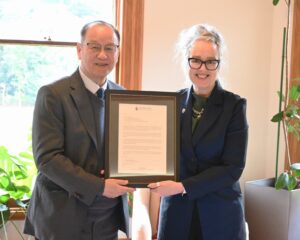Do we do enough to honour manufacturing pioneers?
What began in 1998 as a small garage start-up in West Auckland is now one of New Zealand’s largest dual-market export operations
 From a West Auckland garage start-up to a $225m global biotech expansion, Professor Yihuai Gao’s journey shows how manufacturing innovation can transform New Zealand’s economy if only we celebrate and support the people behind it.
From a West Auckland garage start-up to a $225m global biotech expansion, Professor Yihuai Gao’s journey shows how manufacturing innovation can transform New Zealand’s economy if only we celebrate and support the people behind it.
NZ Manufacturer business advisor and director of public relations agency Impact PR Mark Devlin, says Gao’s success highlights the need for New Zealand to broaden its definition of innovation beyond agriculture and technology start-ups.
When New Zealand talks about innovation, the spotlight too often shines on technology start-ups, film, or agriculture. Yet the nation’s manufacturing success stories are equally compelling and frequently overlooked. The recent recognition of Professor Yihuai Gao by Massey University is a timely reminder of the people driving breakthroughs behind the scenes of our manufacturing economy.
A life in science and manufacturing
Earlier this month, Massey University honoured Professor Yihuai Gao for a two-decade scientific collaboration centred on medicinal mushrooms. Gao, founder of nutraceutical manufacturer Alpha Group, has built a bridge between science, manufacturing, and international commerce.
What began in 1998 as a small garage start-up in West Auckland is now one of New Zealand’s largest dual-market export operations. Alpha Group operates a biotech manufacturing facility in Manukau alongside a growing international footprint.
Its nutraceuticals, built on validated bioactives from fungi and plants, are distributed to markets across Asia and beyond.
This is not just a research story. It is a manufacturing story. Turning fungi science into certified health products that meet stringent global standards requires advanced processing, regulatory expertise, and scale.
Alpha Group exemplifies the type of high-value manufacturing New Zealand needs more of, yet the name of its founder is unfamiliar to many outside the sector.
From garage to global
Alpha Group’s trajectory illustrates how entrepreneurial science can fuel manufacturing expansion. This year the company announced construction of a NZ$115 million biotech facility in Ningde, China. At 60,000m², the site will integrate research, testing, and production close to its largest export market, a move expected to generate over NZ$225 million in annual revenue.
It is the physical realisation of a long-term dual-market strategy that leverages New Zealand’s scientific strengths while harnessing China’s demand and infrastructure. The facility will shorten lead times, expand capacity, and funnel new investment back into New Zealand R&D and jobs.
For a business that began in a West Auckland garage, the scale of this global expansion is staggering.
Breakthroughs in fermentation
At the heart of this success lies one of New Zealand’s most significant biotech breakthroughs: a patented fermentation method for Ganoderma Lingzhi, a mushroom revered in Chinese medicine for its immune and cardiovascular benefits.
Traditionally, Lingzhi takes six months to cultivate in the wild. Alpha Group’s method grows it in fewer than ten days, producing consistent, potent yields.
Approved by New Zealand’s Environmental Protection Authority, the technology has become the first of its kind to be commercialised here. More than that, it provides a platform adaptable to other fungi, plants, and marine organisms.
This innovation not only secures Alpha’s commercial edge but also positions New Zealand as a serious contender in the fast-growing functional food and nutraceutical sector.
As Gao himself has noted, fermentation offers a clean, climate-resilient pathway to produce bioactive-rich compounds at scale without depleting ecosystems or depending on arable land. In a world grappling with food security and health challenges, this is more than manufacturing. It is manufacturing with purpose.
Why recognition matters
Manufacturing has long struggled with perception in New Zealand. Too often it is seen as traditional or low-tech, rather than the bedrock of economic resilience it truly is.
Figures like Professor Yihuai Gao prove otherwise. Manufacturing today is about blending science, technology, and global supply chains to create high-margin, export-led businesses.
Recognition matters. It inspires the next generation of innovators, strengthens the industry’s visibility in policy circles, and demonstrates the value of university and industry collaboration.
Gao’s partnership with Massey University’s Riddet Institute shows how academic research can translate into world-class products when coupled with entrepreneurial drive and manufacturing excellence.
A call to celebrate our innovators
As a country, we celebrate rugby coaches, Oscar winners, and tech unicorns. But how often do we put manufacturing innovators on the national stage?
People like Professor Yihuai Gao, holder of 58 patents, producer of dozens of globally distributed products, and leader of a company that has invested more than NZ$830 million in global infrastructure, should be household names.
If New Zealand wants to position itself as a hub for advanced manufacturing, then we must do more than invest in research. We must champion the individuals who turn ideas into manufactured reality.
Recognising pioneers like Professor Gao is not just a courtesy. It is an economic strategy.



